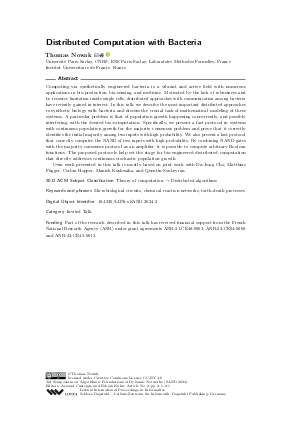Distributed Computation with Bacteria (Invited Talk)
Author
Thomas Nowak 
-
Part of:
Volume:
3rd Symposium on Algorithmic Foundations of Dynamic Networks (SAND 2024)
Part of: Series: Leibniz International Proceedings in Informatics (LIPIcs)
Part of: Conference: Symposium on Algorithmic Foundations of Dynamic Networks (SAND) - License:
 Creative Commons Attribution 4.0 International license
Creative Commons Attribution 4.0 International license
- Publication Date: 2024-05-31
File

PDF
LIPIcs.SAND.2024.2.pdf
- Filesize: 328 kB
- 1 pages
Document Identifiers
Subject Classification
ACM Subject Classification
- Theory of computation → Distributed algorithms
Keywords
- Microbiological circuits
- chemical reaction networks
- birth-death processes
Metrics
- Access Statistics
-
Total Accesses (updated on a weekly basis)
0PDF Downloads0Metadata Views
Abstract
Computing via synthetically engineered bacteria is a vibrant and active field with numerous applications in bio-production, bio-sensing, and medicine. Motivated by the lack of robustness and by resource limitation inside single cells, distributed approaches with communication among bacteria have recently gained in interest. In this talk, we describe the most important distributed approaches to synthetic biology with bacteria and discuss the crucial task of mathematical modeling of these systems. A particular problem is that of population growth happening concurrently, and possibly interfering, with the desired bio-computation. Specifically, we present a fast protocol in systems with continuous population growth for the majority consensus problem and prove that it correctly identifies the initial majority among two inputs with high probability. We also present a fast protocol that correctly computes the NAND of two inputs with high probability. By combining NAND gates with the majority consensus protocol as an amplifier, it is possible to compute arbitrary Boolean functions. The proposed protocols help set the stage for bio-engineered distributed computation that directly addresses continuous stochastic population growth. Own work presented in this talk is mostly based on joint work with Da-Jung Cho, Matthias Függer, Corbin Hopper, Manish Kushwaha, and Quentin Soubeyran.
Cite As Get BibTex
Thomas Nowak. Distributed Computation with Bacteria (Invited Talk). In 3rd Symposium on Algorithmic Foundations of Dynamic Networks (SAND 2024). Leibniz International Proceedings in Informatics (LIPIcs), Volume 292, p. 2:1, Schloss Dagstuhl – Leibniz-Zentrum für Informatik (2024)
https://doi.org/10.4230/LIPIcs.SAND.2024.2
BibTex
@InProceedings{nowak:LIPIcs.SAND.2024.2,
author = {Nowak, Thomas},
title = {{Distributed Computation with Bacteria}},
booktitle = {3rd Symposium on Algorithmic Foundations of Dynamic Networks (SAND 2024)},
pages = {2:1--2:1},
series = {Leibniz International Proceedings in Informatics (LIPIcs)},
ISBN = {978-3-95977-315-7},
ISSN = {1868-8969},
year = {2024},
volume = {292},
editor = {Casteigts, Arnaud and Kuhn, Fabian},
publisher = {Schloss Dagstuhl -- Leibniz-Zentrum f{\"u}r Informatik},
address = {Dagstuhl, Germany},
URL = {https://drops.dagstuhl.de/entities/document/10.4230/LIPIcs.SAND.2024.2},
URN = {urn:nbn:de:0030-drops-198807},
doi = {10.4230/LIPIcs.SAND.2024.2},
annote = {Keywords: Microbiological circuits, chemical reaction networks, birth-death processes}
}
Author Details
Funding
Part of the research described in this talk has received financial support from the French National Research Agency (ANR) under grant agreements ANR-21-CE48-0003, ANR-23-CE04-0008, and ANR-23-CE45-0013.
